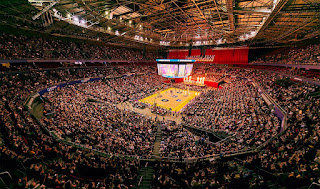
Some of Australia's major sports stadiums are using facial recognition technology when spectators attend sporting events and concerts, consumer rights organisation CHOICE says.
The technology is often being used without people’s knowledge or consent.
CHOICE analysed the privacy policies and conditions of entry statements of 10 stadiums and stadium operators, and found many allowed for facial recognition use without providing information on exactly where and how it is used.
“It is extremely concerning that facial recognition technology is being used at major concert and sporting venues across the country, without any kind of clear information for consumers about where, how and why it is being used,” says CHOICE consumer data advocate Kate Bower.
“We’re particularly worried about Qudos Bank Arena (in Sydney, above), owned by Ticketek’s parent company TEG - one of the biggest players in the Australian data broking space.
"TEG is not clear on how and why they collect and use facial recognition data, leaving the door open for harmful selling and sharing of sensitive biometric information.
“Qudos can hold up to 21,000 people and is set to host a number of big events this year alone, including Lizzo, Sam Smith and Disney on Ice.
"The amount of biometric data that potentially could be collected, stored and shared by TEG just in 2023 is massive.”
Qudos has said it alerts attendees to the use of facial recognition through digital signage and their conditions of entry.
These signs, however, are hard to find, difficult to read and would take an average reader over 12 minutes to get through, CHOICE says. The signage doesn’t mention how the information is stored, shared or used.
CHOICE is urgently calling for stronger regulation of facial recognition to protect the community from harmful and invasive use of this technology.
“Stadiums are places where many people, including children, gather to have fun and make memories. If facial recognition is being used in these venues, people should have the choice to opt in or out," says Bower.
"Instead, any details regarding the use of this technology are usually buried deep in a privacy policy or conditions of entry..
"Clear guidelines are needed to ensure safe and responsible use of facial recognition technology, and to hold businesses to account when they are using this controversial technology inappropriately or dangerously.”


No comments:
Post a Comment